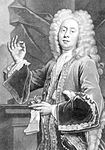
The Squire of Alsatia is a 1688 comedy play by the English writer Thomas Shadwell. Alsatia was a nickname for the Whitefriars area of London, deriving from Alsace in northeastern France. A restoration comedy, it was performed at the Drury Lane Theatre by the United Company following on from John Crowne's Darius, King of Persia. One of the best-remembered roles, that of the shrewish Mrs. Termagant was first performed by Elizabeth Boutell. It was revived numerous times during the eighteenth century.
Regulus is a 1692 tragedy by the English writer John Crowne. It portrays the career of Marcus Atilius Regulus, a Roman Consul at the time of the First Punic War. A separate play of the same title was written by William Havard in 1744.
Darius, King of Persia is a 1688 tragedy by the English writer John Crowne. It portrays the reign of Darius III of Persian Empire, focusing on his defeat by Alexander the Great and subsequent death.
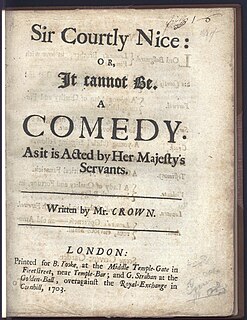
Sir Courtly Nice: Or, It Cannot Be is a 1685 comedy play by the English writer John Crowne. Rehearsals by the United Company were underway when the death of Charles II in February led to the closure of all theatres as a mark of respect. The play was eventually staged on 9 May at the Theatre Royal, Drury Lane. It is the tradition of the Restoration Comedy. A popular hit it became a stock part of the repertoire for more than a century, with Colley Cibber and Anne Oldfield appearing in a celebrated 1709 revival.
Squire Oldsapp is a 1678 comedy play by the English writer Thomas D'Urfey. Staged by the Duke's Company at the Dorset Garden Theatre in London, the original cast included Thomas Betterton as Welfore, William Smith as Henry, John Crosby as Lovell, James Nokes as Squire Oldsapp, Anthony Leigh as Sir Frederick Banter, Samuel Sandford as Colonel Buff, Cave Underhill as Pimpo, Emily Price as Christina and Elizabeth Currer as Madame Tricklove.
The Country Wit is a 1676 comedy play by the English writer John Crowne, part of the tradition of Restoration Comedy. It was first staged at the Dorset Garden Theatre in London by the Duke's Company. The cast included Samuel Sandford as Sir Thomas Rash, Thomas Betterton as Ramble, James Nokes as Sir Mannerly Shallow, Henry Harris as Merry, Cave Underhill as Booby, Matthew Medbourne as Lord Drybone, Anthony Leigh as Rash, Mary Betterton as Lady Faddle, Mary Lee as Christina, Elizabeth Currer as Betty Frisque and Elinor Leigh as Isabella.
Charles VIII of France also known by the longer title The History Of Charles The Eighth Of France; Or, The Invasion Of Naples Of The French is a 1671 tragedy by the English writer John Crowne. It is based on the reign of Charles VIII of France and particularly his Italian War of the 1490s.
The Marriage-Hater Matched is a comedy play by the English writer Thomas D'Urfey. It was first staged by the United Company at the Theatre Royal, Drury Lane in January 1692. The original cast included John Bowman as Brainless, William Mountfort as Sir Philip Freewit, Samuel Sandford as Limber, John Hodgson as Darewell, Anthony Leigh as Myn Here Van Grin, George Bright as Bias, Thomas Doggett as Solon, William Bowen as Callow, Colley Cibber as Splutter, Elizabeth Barry as Lady Subtle, Katherine Corey as Lady Bumfiddle, Anne Bracegirdle as Phoebe, Charlotte Butler as La Pupsey and Abigail Lawson as Margery.

A Fond Husband; Or, The Plotting Sisters also known as The Fond Husband is a 1677 comedy play by the English writer Thomas D'Urfey. It was first staged by the Duke's Company at London's Dorset Garden Theatre with a cast that included William Smith as Rashley, Henry Harris as Ranger, James Nokes as Peregrine Bubble, Anthony Leigh as Old Fumble, Samuel Sandford as Sir Roger Petulant, Thomas Jevon as Sneak, John Richards as Spatterdash, Thomas Percival as Apothecary, Elizabeth Barry as Emillia, Rebecca Marshall as Maria and Margaret Hughes as Cordelia. The published version was dedicated to the Irish statesman James Butler, Duke of Ormonde.

The Wives Excuse also The Wives Excuse; Or, Cuckolds Make Themselves is a 1691 comedy play by the Anglo-Irish writer Thomas Southerne. The title is sometimes written more grammatically as The Wives' Excuse.
John Crosby was an English stage actor of the Restoration Period. He first recorded performance is in 1662 when he appeared in Ignoramus at Whitehall Palace, likely as a child actor. It was further eight years before he was solidly established in the Duke's Company in 1670 beginning with The Forc'd Marriage by Aphra Behn. He became a regular with the company over the following decade, often playing young lover roles. He retired from the stage in 1679 and later became a justice of the peace for Middlesex. He died on 8 April 1724 and was buried in St Sepulchre.
Juliana; Or, The Princess Of Poland is a 1671 tragedy by the English writer John Crowne. It was originally staged by the Duke's Company at the Lincoln's Inn Fields Theatre in London.
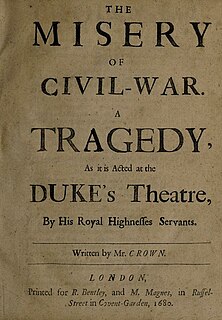
The Misery of Civil War is a 1680 tragedy by the English writer John Crowne. It was originally staged by the Duke's Company at the Dorset Garden Theatre in London. The play was staged at the height of the Popish Plot, something Crowne addressed in his prologue. Although he states that "by his feeble skill 'tis built alone, The Divine Shakespeare did not lay one Stone" the plot in fact drew heavily on Henry VI, Part 2 and Part 3
The English Frier; Or, The Town Sparks, sometimes spelt as The English Friar, is a 1690 comedy play by the English writer John Crowne. It was originally staged by the United Company most likely at the Theatre Royal, Drury Lane, although it may have appeared at the Dorset Garden Theatre, the other venue of the company. Written in context of the recent Glorious Revolution, it attacks Catholic priests who meddle in English politics, undermining the constitution.
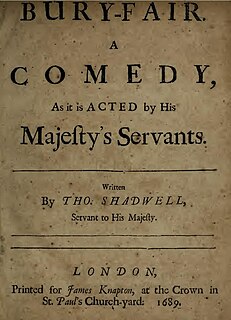
Bury Fair is a 1689 comedy play by the English writer Thomas Shadwell. It is part of the tradition of Restoration Comedy that flourished during the era. It was first staged by the United Company at the Theatre Royal, Drury Lane in London.
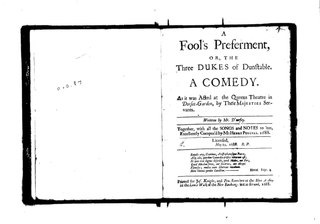
A Fool's Preferment; Or, The Three Dukes Of Dunstable is a 1688 comedy play by the English writer Thomas D'Urfey. It is a reworking of John Fletcher's Jacobean work The Noble Gentleman. It was first performed by the United Company at the Dorset Garden Theatre in London. Henry Purcell composed the play's incidental music. It was his first major work composingfor the theatre in seven years since Sir Barnaby Whigg.

City Politiques is a 1683 comedy play by the English writer John Crowne. It was first performed by the United Company at the Theatre Royal, Drury Lane by the recently formed United Company. The original cast are not known.
The Ambitious Statesman; Or, The Loyal Favourite is a 1679 tragedy by the English writer John Crowne. It was originally staged by the King's Company at the Theatre Royal, Drury Lane in London. The original cast is unknown except for Joseph Haines who played La Marre, and also spoke the epilogue.
Thyestes, A Tragedy is a 1680 tragedy by the English writer John Crowne. It was originally staged by the King's Company at the Theatre Royal, Drury Lane. The original cast is unknown. It is based on Thyestes by Seneca.
Charlotte Butler was an English stage actress and singer of the seventeenth century. She may have joined the Duke's Company in the 1670s, but her first definite recorded performance was in Aphra Behn's The Revenge (1680)









